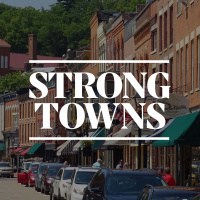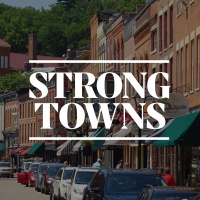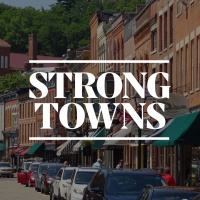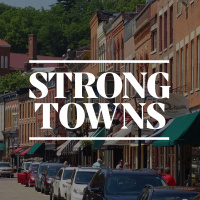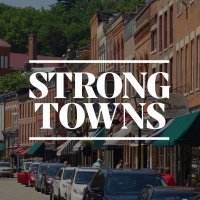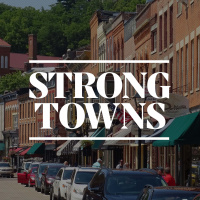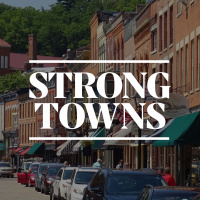Sinopsis
We advocate for a model of development that allows our cities, towns and neighborhoods to grow financially strong and resilient.
Episodios
-
Steve Mouzon: How Do We Rebuild Maui?
11/09/2023 Duración: 01h54sIn light of the recent wildfires in Maui (and other parts of Hawaii), this week’s Strong Towns Podcast episode features a conversation with Steve Mouzon, author of The Original Green and member of the Strong Towns Advisory Board. Mouzon’s work with recovery efforts after disasters in Haiti and Jamaica—as well as his observations of Hurricane Katrina in New Orleans—has offered him valuable insight on what it takes for a community to recover from large-scale destruction. He talks with podcast host Chuck Marohn about his experiences and the lessons we can take away about what types of responses do and don’t work—lessons that could be helpful in rebuilding Maui. ADDITIONAL SHOW NOTES Steve Mouzon (Twitter). Original Green (website). Chuck Marohn (Twitter). Learn more about the 2023 Local-Motive Tour.
-
Walkable City Design Is Critical for Economic Health
28/08/2023 Duración: 01h24minAfter World War II, the U.S. embarked on an experiment in how we build cities. Instead of creating places scaled to people who walked, we built suburbs that focused on moving cars quickly and efficiently. Many cities in North America are looking to become walkable again, but it’s not easy. Time and time again, change makers are hit by bureaucracy and complicated logistics. Why is it so difficult to change? In “Urban Intercurrence: The Struggle to Build Walkable Downtowns in Car-Dependent Suburbia,” author Tristan Cleveland goes in depth about why cities struggle to retrofit their car dependence, and what could actually be done to create change. In this Strong Towns Podcast, host Chuck Marohn chats with Tristan Cleveland, PhD, who is a Strong Towns member and an urban planner at Happy Cities. ADDITIONAL SHOW NOTES Tristan Cleveland (Twitter). Read Tristan’s PhD thesis on how to redesign suburban communities to become healthy, walkable places. Chuck Marohn (Twitter). Learn more about the 2023 Local-Mot
-
Citizen Versus Developer? No! It’s Citizen As Developer.
24/07/2023 Duración: 39minRecently, an article came out of Medicine Hat, Alberta, reflecting on some development conversations happening within the city, inspired by Strong Towns presentations. When Chuck Marohn read the article, he felt core insights were missing or misunderstood within the piece. On this episode of the Strong Towns Podcast, Chuck discusses the challenges faced by local journalists and the impact it has on the quality of reporting. He shares his personal experience with his wife, who is a reporter, and highlights the difficulties they encounter in producing articles with limited resources and tight deadlines. Additionally, Chuck delves into the topic of citizen-led development and its potential to reshape cities in a more sustainable and inclusive manner. Throughout the podcast, he emphasizes the need for public engagement and the importance of creating neighborhoods that evolve and improve over time. ADDITIONAL SHOW NOTES Learn more about the Community Action Lab in Medicine Hat. Chuck Marohn (Twitter).
-
Four Communities Are Becoming Examples of Change
12/07/2023 Duración: 53minChange is not always easy, and without examples, it can be difficult to reimagine how we do things. That’s just one of the reasons Strong Towns decided to launch the Community Action Lab: a carefully customized, two-year relationship between Strong Towns and selected cities seeking to make a change. Four cities are currently leading the way through this program in applying Strong Towns concepts and ideas from the bottom up. This week on the Strong Towns Podcast, Chuck talks about the Community Action Lab, and some of the experiences, conversations, and insights he’s gained while working with these four communities. ADDITIONAL SHOW NOTES Learn more about The Community Action Lab. Chuck Marohn (Twitter).
-
From 500 to 5,000: What Strong Towns Members Are Doing to Make Their Places Better
12/06/2023 Duración: 42minJust a couple weeks ago, we got the opportunity to meet nearly 500 Strong Towns members for the first time at the Strong Towns National Gathering. It is evident that Strong Towns members are people who care deeply about their place: We heard so many compelling stories about people working to make their town stronger. In this podcast, as part of our Member Week, we wanted to share Strong Towns President Chuck Marohn’s introductory speech from the Gathering. Tune in to hear him talk about some of the amazing things that Strong Towns members are doing in their communities. Our members are crucial to everything that happens at Strong Towns. Without you, we wouldn’t be here. If you haven’t already, take a moment to become a Strong Towns member today. ADDITIONAL SHOW NOTES Chuck Marohn (Twitter). Cover image source: ZED images.
-
Dollar Stores Are Leeching the Economic Vitality of Communities Across the U.S.
05/06/2023 Duración: 53minA recent report from the Institute for Local Self-Reliance reveals some shocking facts: In 2021, half of the new stores opened in the U.S. were chain dollar stores. Moreover, Dollar Store and Dollar Tree (which are part of the Family Dollar system) together operate more than 34,000 stores. That’s more than McDonald’s, Starbucks, Target, and Walmart combined. How did we get to this point, how does this transformation in retail affect local economies, and what can communities do to protect themselves from this "dollar store invasion”? Stacey Mitchell, co-executive director of the Institute for Local Self-Reliance and one of the authors of the aforementioned report, joins Chuck Marohn today on the Strong Towns Podcast for this conversation. ADDITIONAL SHOW NOTES Read The Dollar Store Invasion report from the Institute for Local Self-Reliance. Institute for Local Self-Reliance (website). Stacey Mitchell (Twitter). Chuck Marohn (Twitter).
-
Ian Lockwood: Thoughts From an Engineer
01/05/2023 Duración: 56minHow should engineers be thinking about building wealth in communities? That’s just one of the questions Chuck Marohn asks of Ian Lockwood, a recognized national leader in sustainable transportation policy and urban design. Lockwood is currently a livable transportation engineer for Toole Design, an engineering firm which works to build safer and more walkable streets. On this Strong Towns Podcast, join Marohn and Lockwood as they talk about the work of Toole Design, complete streets, and more. ADDITIONAL SHOW NOTES Ian Lockwood (Twitter). Chuck Marohn (Twitter).
-
What’s Going On With the Recent Bank Failures?
03/04/2023 Duración: 59minIn March 2023, major banks collapsed, interest rates have been rising, and many people are greatly—and rightly—concerned about inflation. In this week’s episode of the Strong Towns Podcast, Chuck Marohn talks about the financial system, and provides insights on what’s currently happening in the banking industry. ADDITIONAL SHOW NOTES Chuck Marohn (Twitter).
-
Growth Through Destruction
20/03/2023 Duración: 56minIn 1906, a powerful earthquake in San Francisco, California, damaged a good portion of the city, causing havoc and distress as 28,188 buildings were destroyed, and over 3,000 people were killed. Curiously, after this tragic disaster, things began to grow again, but this time the built environment came back stronger. Seth Zeren, a founding member of Strong Towns, wrote about this phenomenon last month, and this week on the Strong Towns Podcast, Chuck Marohn and Zeren chat about complexity, and if complex systems can grow stronger through destruction. ADDITIONAL SHOW NOTES “Do Things Need to Burn for New Things to Grow?” by Seth Zeren, Strong Towns (Feb, 2023). Subscribe to Seth Zeren’s Substack, Build the Next Right Thing. Chuck Marohn (Twitter).
-
On the Conservative Reaction to 15-Minute Cities
13/03/2023 Duración: 56minWe believe everyone can build a Strong Town, but all too often, political differences divide communities, and instead of working together to build stronger neighborhoods from a bottom-up approach, we get caught up in contentious, top-down ideas and conversations. One such political divide has developed around the concept of the 15-minute city: a term used to describe traditional neighborhoods. While to urbanists it describes a walkable place, to critics, it’s a potential infringement on personal freedoms. In this episode of the Strong Towns Podcast, Chuck Marohn dives into the controversies surrounding the 15-minute city. ADDITIONAL SHOW NOTES Charles Marohn (Twitter).
-
The Property Tax System is Broken—Regrid Works on Tools to Help Fix It
20/02/2023 Duración: 54minThe property tax system is broken all across the nation. In Detroit, residents face an issue of inconsistent assessments, where two homes that are similar in condition and sitting on similar-sized lots have widely different assessment scores. Recently, the team at Regrid, an industry-leading property data and location intelligence company, put together an Assessment Gauge map that may prove to be a useful tool for homeowners, assessors, or nonprofits in bringing a much-needed balance to overassessments. Today on the Strong Towns Podcast, Chuck Marohn welcomes back Alex Alsup, vice president of research and development at Regrid, to talk about assessments and property tax in Detroit, how the Strong Towns approach worked for Alsup and his team, and an overview of the assessment process. Read more about the Assessment Gauge in the article “Check Your Temperature- You Might Have an Assessment Fever.” To learn more about Regrid or get access to their parcel data, click here. ADDITIONAL SHOW NOTES Regrid (websi
-
Jeff Speck on the 10th-Anniversary Edition of Walkable City
13/02/2023 Duración: 01h06minToday on the Strong Towns Podcast, Chuck Marohn welcomes back Jeff Speck, city planner and author, to talk about a brand-new version of his book, Walkable City: How Downtown Can Save America, One Step at a Time. It’s the 10th anniversary for the book, and a lot has changed in the U.S. since the original was published. While the content from the first edition is still relevant today, this updated version holds over 100 pages of new information useful to those actively working to make their cities stronger. Listen to Chuck and Speck talk in depth about some of those book additions, including (but not limited to) COVID’s impact on cities, the reckless driver narrative, and a simple truth about street trees. ADDITIONAL SHOW NOTES Get the new edition of Walkable City: How Downtown Can Save America, One Step at a Time. Jeff Speck (Twitter). Charles Marohn (Twitter).
-
Lawsuit Update: Making a Stand for Engineers in the Minnesota State Court of Appeals
30/01/2023 Duración: 50minAnyone should be able to speak up and question whether current engineering practices truly benefit our communities. That’s especially true for licensed professionals who have a special duty to the public to be heard. And when they do speak up, their statements should not make them a target for licensing boards. Members of the Minnesota board of engineering licensure are supposed to uphold the integrity of their institution, but instead they have abused their power, overstepping their authority in order to slander a leading reformer—someone who was not even practicing engineering—by issuing a state order against Strong Towns founder and president, Charles Marohn. We’re fighting to have the board’s decision overturned. In this Strong Towns Podcast, listen to the latest update on the appeal for this case and the oral arguments made in front of the Minnesota Court of Appeals. For more information on this case, visit www.strongtowns.org/supportreform. ADDITIONAL SHOW NOTES Learn more about our fight for enginee
-
Mike Hathorne: Where Does Decision-Making Need to Occur in Our Communities?
09/01/2023 Duración: 51minHow far up the chain of command does a problem need to go before someone can make a decision on it? According to the concept of subsidiarity, it matters less what decision is made and more who makes the decision—in other words, a decision should be made at the lowest level that it can competently be made. Mike Hathorne, principal of community planning and design at Commun1ty.one and Strong Towns member, works with cities to create decision-making processes that can impact how our places function. Today, he joins Chuck Marohn on the Strong Towns Podcast to discuss subsidiarity in a practical sense. For further listening on this topic, check out the episode “What Customer Service Should Mean for a City,” where Chuck talks about his personal experience with subsidiarity and how it forms in our places. ADDITIONAL SHOW NOTES “Subsidiarity,” by Mike Hathorne, Commun1ity.one (August 2018). Commun1ty.one’s website. Mike Hathorne (Twitter). Charles Marohn (Twitter).
-
Ben Hunt: In Praise of Bitcoin
02/01/2023 Duración: 54minToday’s Strong Towns Podcast guest, Ben Hunt, wrote on Epsilon Theory that “Bitcoin has been an authentic expression of identity, a positive identity of autonomy, entrepreneurialism, and resistance to the Nudging State and the Nudging Oligarchy.” Today, join Chuck Marohn as he invites Hunt onto the podcast to discuss his insights on Bitcoin, the story of investing, and how it connects to all of us. ADDITIONAL SHOW NOTES “In Praise of Bitcoin,” by Ben Hunt, Epsilon Theory (April 2021). Read more Epsilon Theory here. Ben Hunt (Twitter). Charles Marohn (Twitter).
-
Thanks for a Great Year
19/12/2022 Duración: 08minIt's been a great year for the Strong Towns Podcast; thanks for listening. We wanted to close out 2022 with one last message, and to wish you Happy Holidays and a Happy New Year!
-
Sam Quinones: True Tales of America and Hope in the Time of Fentanyl and Meth
05/12/2022 Duración: 01h04minThis week on the Strong Towns Podcast, Chuck Marohn chats with Sam Quinones, author and journalist, about his most recent book: The Least of Us: True Tales of America and Hope in the Time of Fentanyl and Meth. Along with doing a deep dive on particular sections of the book, Quinones tells how we went from city hall reporter to writing books about addiction. ADDITIONAL SHOW NOTES Sam Quinones’s website. Order your copy of The Least of Us: True Tales of America and Hope in the Time of Fentanyl and Meth. Sam Quinones (Twitter). Charles Marohn (Twitter).
-
Get Ready for #BlackFridayParking
23/11/2022 Duración: 16minOur annual Black Friday Parking event is coming up, so get your cameras ready! Black Friday Parking is a nationwide event drawing attention to the harmful nature of minimum parking requirements. Parking minimums create a barrier for new local businesses and fill up our cities with empty parking spaces that don’t add value to our places. Every year on Black Friday, one of the biggest shopping days of the year, people all across North America snap photos of the (hardly full) parking lots in their communities to demonstrate how unnecessary these massive lots are. Participants upload those photos to social media with the hashtag #blackfridayparking. For more information, visit strongtowns.org/blackfridayparking.
-
The Impact of Systemic Racism on Jackson’s Water Crisis
21/11/2022 Duración: 55minA prominent question that keeps coming up since the beginning of the Jackson, Mississippi, water crisis is, “How did we get to this point?” If you’ve been tuning in to the Strong Towns Podcast, you’ll know that Chuck has talked about the water crisis in Jackson a couple of times working to answer this question. He’s gone in depth about the financial fragility of our water systems, how they work, and why we even have them. After hearing Chuck’s analysis, some Strong Towns members felt there was not enough emphasis on the impact systemic racism has had on the situation. In this podcast, Chuck talks with Amanda Lanata, Strong Towns member and former Jackson resident, on the racial complexities in Jackson and how race is linked to the water crisis. ADDITIONAL SHOW NOTES “The Jackson Water Crisis Is Not a Fluke. Your City Could Be Next,” hosted by Charles Marohn, Strong Towns Podcast (September 2022). “Water System Crises and Solutions,” hosted by Charles Marohn, Strong Towns Podcast (November 2022). Don’t
-
A Behind-the-Scenes Look at the Most Comprehensive Resource Strong Towns Offers
18/11/2022 Duración: 16minThe final installment of this week’s special Member Week Strong Towns Podcast features a discussion between Chuck Marohn and Strong Towns’ new director of community action, Edward Erfurt. Longtime listeners may remember Edward as a guest from past episodes, but today he’s here as a full-fledged member of the Strong Towns staff. We’re excited to share a behind-the-scenes look at the program Edward is overseeing: the Strong Towns Community Action Lab. This 24-month program is the most comprehensive resource Strong Towns offers, putting participating communities on a trajectory toward enduring prosperity. We’re able to take on new initiatives like the Community Action Lab thanks to the support of our members. If you haven’t joined yet, please consider doing so today. Become a Strong Towns member and know that your contribution is going toward the strengthening of communities all across North America.


